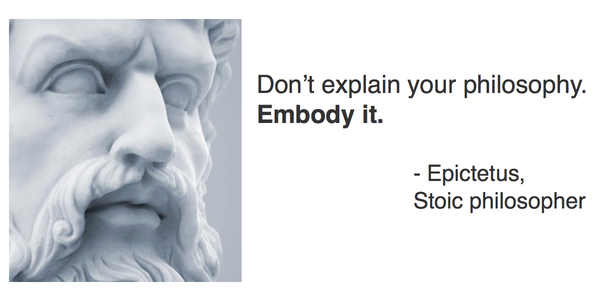Navigating Life Through Philosophy: Practical Applications
Written on
Chapter 1: Understanding the Role of Philosophy in Daily Life
How can a seemingly abstract discipline like philosophy assist you in your everyday life?

This is a valid inquiry. Many individuals perceive philosophy as an abstract realm, primarily involving reading texts and mulling over complex ideas, often distancing themselves from the practicalities of daily existence. However, philosophy can extend beyond mere contemplation; it possesses a practical dimension that can be seamlessly integrated into our lives. By cultivating habits that reinforce philosophical concepts, adopting value systems that resonate with us, and honing our critical thinking skills—distinguishing what is beneficial from what is not—we can align our behaviors with the philosophies we admire.
Engaging with philosophy not only enriches our understanding of the world but also fosters significant personal growth. A prime example of a philosophy that I find particularly applicable is Stoicism. This ancient school of thought offers numerous practical insights that resonate with our contemporary experiences.
The original Stoics—figures like Seneca, Zeno, Marcus Aurelius, Musonius Rufus, and Epictetus—did not claim to embody perfection; rather, they emphasized the pursuit of virtue and meaningful living, focusing inward rather than outward. Their commitment to virtue was reflected in the habits they cultivated over many years, illustrating the importance of practical application in philosophy.
By adopting daily routines influenced by Stoic principles, we can better navigate the myriad challenges and surprises of adulthood. Here are three key habits to incorporate Stoicism into your life:
Philosophy for a Better Life: Life-Changing Philosophies You Need to Know
This video explores transformative philosophical ideas that can lead to a more fulfilling life.
Section 1.1: Embracing Discomfort
- Embrace Discomfort: Being Stoic does not equate to remaining within your comfort zone. This zone, filled with familiar experiences, can stifle growth. For instance, if studying for long hours at your desk leaves you fatigued and uninspired, it may be time to reassess your approach. Sticking to familiar problem-solving methods at work, despite their ineffectiveness, limits your potential for growth. By stepping outside your comfort zone, you open yourself up to new experiences, which might feel uncomfortable at first but are essential for development.
- Acknowledge Your Feelings: Stoicism is not about denying emotions. Instead, it involves recognizing and processing your feelings—whether fear, frustration, or self-doubt. Understanding your emotions can empower you.
- Self-Reliance in Problem-Solving: Before seeking help from others, attempt to tackle challenges independently. Mistakes are a natural part of learning, guiding you toward success and fostering resilience.
- Experiment with Solutions: Be open to trying new methods for overcoming challenges. Learning from these experiences will enhance your adaptability.
Section 1.2: Cultivating Self-Discipline
- Practice Self-Discipline: Among the most crucial habits for practicing Stoicism is self-discipline. Engaging in challenging activities first can lead to greater satisfaction later. Research, like Stanford's Marshmallow Experiment, underscores the importance of delayed gratification for success.
- Optimize Your Mornings: Establish a morning routine focused on deep work—reading, writing, or problem-solving. The first few hours of the day can be your most productive.
- Limit Digital Distractions: Resist the urge to check your phone first thing in the morning. Turning off notifications can help you avoid unnecessary distractions.
- Prioritize Rest and Enjoyment: After completing your daily tasks, allow yourself to unwind. However, ensure leisure activities do not detract from your productivity.
Chapter 2: Avoiding Time-Wasting Activities
Understanding and Defining Work from a Philosophical Point of View
This video delves into the philosophical understanding of work and its significance in our lives.
- Eliminate Pointless Activities: Stoic philosopher Seneca addresses the issue of wasting time on trivial pursuits in his work, On the Shortness of Life. While many faced similar challenges in his time, the struggle continues today.
- Reduce Social Media Usage: Track your social media engagement and set limits to ensure it doesn't consume your time.
- Avoid Gossip: Engaging in gossip serves little purpose. Instead, focus on meaningful conversations that foster learning and positivity.
- Stay Goal-Oriented: Keep a clear goal in mind. Each morning, ask yourself, "What is my primary objective today?" This clarity will enhance your focus and productivity.
In the wise words of Seneca, "Nothing happens to the wise man against his expectation." Embracing philosophy, particularly Stoicism, equips us with tools to navigate the complexities of life more effectively.